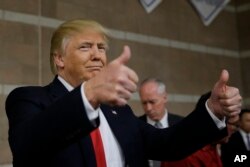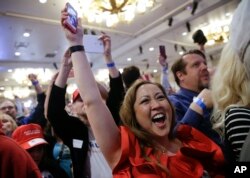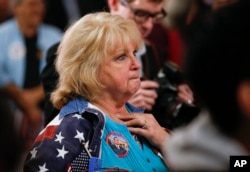Donald Trump won his third victory in four contests with a commanding lead in the Nevada caucus Tuesday, securing his status as the Republican front-runner heading into next week's crucial Super Tuesday votes in more than a dozen states.
The win follows his first-place finishes in New Hampshire and South Carolina, two states no candidate has won without going on to become the Republican nominee.
Trump's seemingly inevitable path to the Republican nomination, however, is fueled by a fractured, five-candidate field.
"Donald Trump still has to prove that in a one-on-one or three-man race, he can consistently get to 35, 40, 45 percent of the vote, or 50 percent. Right now that's still unclear," said analyst Stuart Rothenberg, founder of the Rothenberg & Gonzales Political Report.
The billionaire businessman beat opponents Texas Senator Ted Cruz and Florida Senator Marco Rubio in the Nevada Republican caucus Tuesday with almost 46 percent of the vote. Rubio won second place, but with a lead of less than 2,000 votes over Cruz.
Ohio Governor John Kasich and retired surgeon Ben Carson placed fourth and fifth respectively.
The win in Nevada garnered Trump his first congressional endorsements Wednesday, from New York Republican Rep. Chris Collins and Rep. Duncan Hunter, a Republican from California.
Recent public opinion polls show Trump leading in the majority of Super Tuesday states. William Galston, a senior fellow in governance studies at the Brookings Institution, said the chances of stopping Trump in a divided field are not high.
"People who say they support Mr. Trump are typically very committed to him and they come out and vote for him, so there's a reasonably good case, based on experience so far, to take the surveys seriously," he said.
Path forward for Rubio
Rubio solidified his position as the Republican alternative to Trump by securing several key party endorsements, while benefiting from the failure of one-time front-runner Jeb Bush, who faltered and dropped out of the race after the South Carolina primary.
Rubio has not yet won a caucus or primary, and has trailed at least 10 percentage points behind Trump in each of those votes. Rothenberg said Rubio's path forward is "narrow but simple" and involves waiting until the middle of March for primaries in Ohio, Illinois and Florida that award significant numbers of delegates.
"I wouldn't expect any dramatic movement on his part until the middle of March and that means staying alive, convincing his donors that he's still credible, convincing folks in the media that he's still credible," he said.
Just as Trump benefits from a fractured field, Rubio benefits from fewer challengers. After a strong second-place finish in New Hampshire, Kasich came in fifth in South Carolina and Nevada. He remains in the race, but with little hope of securing the nomination.
"If I were Marco Rubio, I would size up the situation," Galston said. "I would say to Mr. Kasich, 'John, you can't win the nomination, but you can sure keep me from winning the nomination and in the process hand over the Republican party to Mr. Trump. So why don't you and I get together and you agree to bow out?"
WATCH: Trump and Cruz supporters in Nevada
The other remaining candidate, Cruz, said he was looking forward to returning to his home state of Texas, one of the states voting on Super Tuesday, after his third-place finish in Nevada.
Cruz said he was looking forward to returning to his home state of Texas, one of many states voting on Super Tuesday, after his third place finish in Nevada. Cruz's poor showing among his core base of evangelical voters in South Carolina contributed to another third-place finish, but he pointed to his caucus win in Iowa, saying, "The only campaign that has beaten Donald Trump and the only campaign that can beat Donald Trump is this campaign."
Cruz leads in polls in Texas and neighboring Arkansas, but his path forward is unclear.
"Cruz has framed his appeal quite narrowly and specifically,” Galston said. “There's a ceiling on his support. He has been unable to commandeer the loyalties of more than one-fifth of the Republican base, and that's just not enough.”
After the March 1 Super Tuesday vote, more than 700 delegates will have been awarded, nearly one-third of the Republican total.
Democrats' final stop
Democratic presidential candidates face a final test Saturday in South Carolina, before heading into Super Tuesday voting. Former Secretary of State Hillary Clinton and Vermont Senator Bernie Sanders face off again after Clinton's win in Nevada's Democratic caucus.
"The road ahead for her over the next two weeks looks really appealing and attractive, and I think she will build up some momentum," Rothenberg said.
Clinton won the support of Senate Democratic Leader Harry Reid on Wednesday, following her Nevada caucus win.
She is expected to do well in South Carolina due to significant support among African-American voters and the endorsement of the state's influential congressman, James Clyburn. A win Saturday will boost Clinton's argument that she will be a stronger candidate than Sanders in the November national general election.
PHOTO GALLERY: Presidential candidates build momentum










